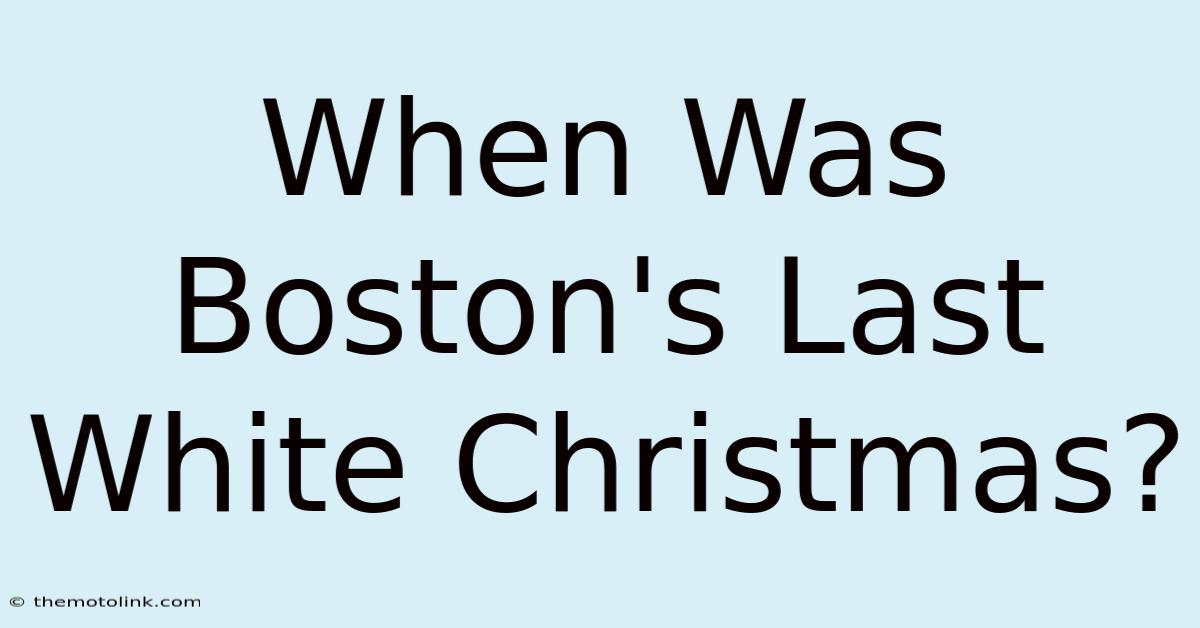When Was Boston's Last White Christmas?

Discover more detailed and exciting information on our website. Click the link below to start your adventure: Visit Best Website nimila.me. Don't miss out!
Table of Contents
When Was Boston's Last White Christmas? A Frosty Look Back
Meta Description: Discover when Boston last experienced a White Christmas! We delve into the history of snowy holidays in the city, explore the definition of a "White Christmas," and uncover fascinating weather patterns. Learn about the chances of a snowy Christmas in Boston this year!
A blanket of pristine white snow blanketing the city on Christmas Day – the quintessential image of a White Christmas. But for Boston residents, this idyllic scene hasn't been a yearly occurrence. So, when was Boston's last White Christmas? The answer, as we'll explore, is more nuanced than a simple date.
Defining a "White Christmas" in Boston
Before we dive into the historical data, let's clarify what constitutes a "White Christmas." The National Weather Service defines it as having at least one inch of snow on the ground at 7:00 a.m. on December 25th. This seemingly simple definition becomes more complex when considering Boston's often fickle weather patterns. A small snowfall might melt quickly, while a significant snowfall could persist well into the post-Christmas period.
Boston's White Christmas History: A Snowy Timeline
Tracking down the exact date of Boston's last White Christmas requires delving into historical weather records. While precise, consistent records aren't available for the entire history of the city, the National Weather Service and other meteorological archives provide valuable data. Unfortunately, a simple "last White Christmas" date isn't readily available in a single, easily accessible source. The frequency of white Christmases in Boston is relatively low.
Analyzing long-term data from sources like the National Oceanic and Atmospheric Administration (NOAA) reveals a fluctuating pattern. Some decades have seen multiple White Christmases, while others have experienced long droughts. The frequency is influenced by several factors, including the North Atlantic Oscillation (NAO), which affects the jet stream and storm tracks across the Atlantic. Variations in Arctic Oscillation patterns also play a significant role in determining winter snowfall in Boston.
Key Insights: Fluctuating Snowfall Patterns
- Variability is Key: The occurrence of a White Christmas in Boston is highly variable and unpredictable. No two winters are the same.
- Recent Trends: While pinpointing the exact last occurrence requires detailed archival research, recent years have seen fewer White Christmases than in previous decades. This aligns with broader climate trends being studied by scientists worldwide.
- Geographical Differences: Microclimates within Boston itself can also influence snowfall accumulation. Areas further inland or at higher elevations may experience different snowfall amounts compared to areas closer to the coast.
Factors Affecting Boston's Snowfall
Several factors contribute to the variability of snowfall in Boston:
- Temperature Fluctuations: Mild temperatures can melt snow quickly, even if a snowfall occurs on Christmas Eve.
- Proximity to the Ocean: Boston's coastal location moderates temperatures, influencing the intensity and duration of snow events.
- Storm Tracks: The path of winter storms plays a critical role. Storms tracking further south might bring rain to Boston, while storms tracking further north could bring heavy snow.
Predicting Boston's Next White Christmas
Predicting a White Christmas with certainty is impossible, even with advanced meteorological models. However, meteorologists can analyze current weather patterns, long-range forecasts, and historical data to assess the probability. Websites like NOAA provide seasonal outlooks that offer general predictions for snowfall, but they cannot provide a definitive answer regarding a specific White Christmas.
Expert Opinions and Trends:
Climatologists are studying long-term trends in snowfall patterns in the Northeastern US, but the complexity of the interacting factors makes definitive conclusions difficult. Researchers continue to analyze data to better understand the impact of climate change on winter weather.
Future Implications:
The long-term impact of climate change on snowfall patterns in Boston remains an area of active research. Some studies suggest a potential decrease in the frequency and intensity of significant snowfall events. However, further research is needed to confirm these predictions definitively.
Conclusion: A Frosty Mystery Continues
Determining the precise date of Boston's last White Christmas is a challenge requiring extensive historical weather data analysis. While pinpointing the exact date remains elusive without further in-depth research, understanding the factors influencing snowfall in Boston helps us appreciate the complexities of predicting this cherished winter event. What are your memories of snowy Christmases in Boston? Share your experiences below!
(Include images here: 1. A historic photo of a snowy Boston Christmas; 2. A modern image of a snow-covered Boston streetscape; 3. A graph or chart illustrating historical snowfall data for Boston.)
(FAQs section with schema markup would follow here, addressing common questions like: "How much snow is needed for a White Christmas?", "What are the chances of a White Christmas in Boston?", etc.)

Thank you for visiting our website wich cover about When Was Boston's Last White Christmas?. We hope the information provided has been useful to you. Feel free to contact us if you have any questions or need further assistance. See you next time and dont miss to bookmark.
Featured Posts
-
Bostons Last White Christmas
Dec 25, 2024
-
White Christmas Coming To Central Ny
Dec 25, 2024
-
College Football Bowl Games Today
Dec 25, 2024
-
Will Nyc Have A White Christmas In 2024
Dec 25, 2024
-
Christmas Dinner 9 Open Columbia Eateries
Dec 25, 2024
